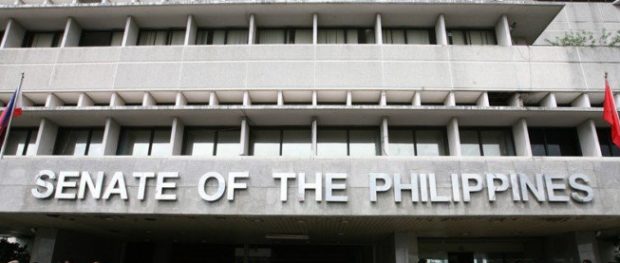
Facade of the Senate of the Philippines building. FILE PHOTO
MANILA, Philippines — The Senate ratified on Tuesday the bicameral conference committee report on a bill seeking to promote foreign investments.
The bicam report on the reconciled version of Senate Bill No. 1156 and House Bill No. 300, which seeks to amend the Foreign Investment Act of 1991, was approved during the Senate session on Tuesday.
The measure aims to improve investment factors to attract, promote, and welcome foreign investment activities, which are seen to contribute to the country’s national industrialization and socio-economic development.
“I am grateful to the House panel for their generosity and openness in accepting our thoroughgoing changes and their significant introduction of many amendments improving the law that we see now,” Sen. Imee Marcos, who sponsored the bill as chairperson of the economic affairs committee, said in her speech.
“Among the agreements settled by both panels are many improvements provided by the House. The bicam conference agreed to use the Senate version as the working draft,” she noted.
Marcos said the bicameral conference committee agreed on the following:
• Section 2 was adopted clarifying the definition of investments in the practice of professions, in particular, adopting the Professional Regulatory Commission’s definition of “profession.”
• Section 3 was adopted with the House panel proposing changes in the composition of the Inter-Agency Investment Promotion Coordination Committee, designating the Finance Secretary as vice chairman, and adding another representative from Metro Manila in addition to representatives from Luzon, Visayas, and Mindanao.
• Section 6 was adopted with the House panel agreeing to the establishment of an online portal for foreign investors.
• Section 7 was adopted with the House panel providing for clarifying of language in compliance with export requirements under CREATE or Title 13 of the National Internal Revenue Code.
• Section 8 was adopted, rationalizing language on labor requirements for employment in firms with lower paid-up capital of $100,000. The reconciled version also strengthened the language for the recognition of the rights of employees and seeks to institutionalize the requirement of understudy programs for alien employment permits.
• Section 9 regarding national security review was provided with the House panel providing clarification on industries to be reviewed. They are now limited to foreign investment involving military-related industries, cyber infrastructure, pipeline transportation, or such other activities which may threaten territorial integrity and safety, security, and well-being of Filipino citizens.
• Section 10 or anti-graft provision of the House was adopted which simplified the list of penalties. Any public official or employee involved in foreign investment promotion who shall commit any of the acts of Section 3 of Republic Act 3019 or the Anti-Graft and Corrupt Practices Act, shall in addition to the penalties provided under Section 9a of said Act, be punished by fine of not less than P2 million but not more than P5 million.
• Section 13 was adopted from the Senate version with the House panel increasing the appropriation of P50 million to be sourced from the contingent fund from the initial allocation of P10 million.
In April, President Rodrigo Duterte urged Congress to fast-track the proposed amendments to the Foreign Investments Act, along with amendments for the Public Service Act and Retail Trade Liberalization Act, to further open up the economy to more foreign investors amid the COVID-19 pandemic.
RELATED STORY
Duterte asks Congress to give priority to new laws removing barriers to foreign investments